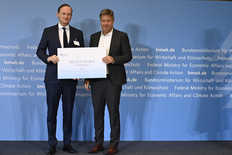- The German Federal Ministry is funding the project with up to €310 million.
- The heat pump will generate up to 500,000 metric tons of CO2-free steam annually.
- Commissioning of the plant is scheduled for 2027.
- The steam will primarily be used for formic acid production.

Project Overview
BASF has received approval for funding from the German Federal Ministry for Economic Affairs and Climate Action to construct the world's largest industrial heat pump at its Ludwigshafen site. This project aims to significantly reduce CO2 emissions by generating CO2-free steam, contributing to BASF's climate protection goals.
Technical Details
The planned heat pump will have a capacity of up to 500,000 metric tons of steam per year. It will utilize waste heat from the cooling and cleaning of process gases in one of the site's steam crackers. Powered by renewable electricity, the heat pump is expected to reduce greenhouse gas emissions by up to 98% for the steam used in formic acid production. A smaller portion of the steam will be distributed to other BASF production plants via the site's steam network.
Funding and Timeline
The German Federal Ministry is contributing up to €310 million to the project under the Carbon Contracts for Difference funding program. The plant is scheduled to be commissioned in 2027, marking a significant step in BASF's efforts to achieve net-zero CO2 emissions by 2050.
Energy and Sustainability
Steam is a crucial energy source in the chemical industry, used for various processes such as drying, heating, and distillation. At Ludwigshafen, BASF already meets half of its steam requirements through low-carbon processes. The remaining steam is currently generated by gas and steam power plants. This project is part of BASF's broader green transformation strategy, which includes using renewable raw materials and electricity, as well as developing new technologies to reduce fossil fuel use in energy production.

